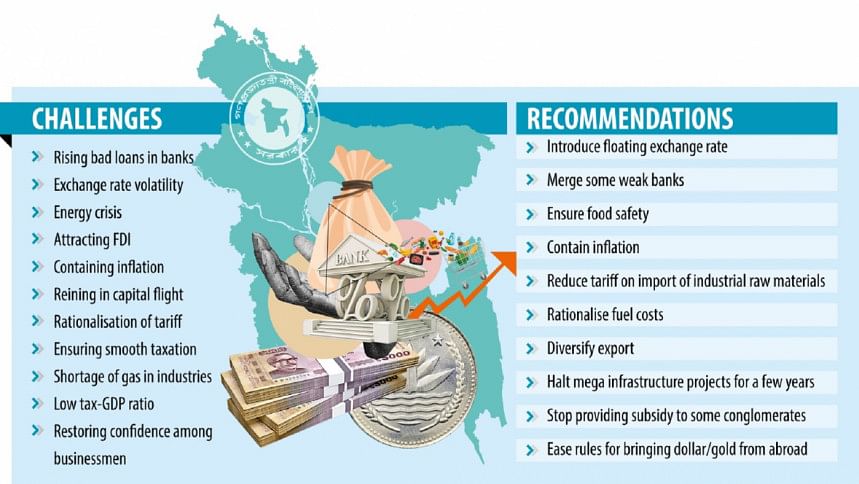Economic ills demand urgent action

The new government urgently needs to establish the rule of law, end the energy crisis, attract foreign direct investments, and control inflation to restore macroeconomic stability, said speakers yesterday.
Ensuring the safety of capital, reining in default loans, ensuring a stable exchange rate, and stopping capital flights are the other major challenges that need to be taken care of, they said.
"The challenges have been identified a lot earlier. Now, the time has come to address them for the stabilisation of the economy," said Ahsan H Mansur, executive director of the Policy Research Institute.
He alleged that most of the challenges have been created by the government.
The economist spoke at a discussion styled "Economy: Challenges for the New Government" organised by the Prothom Alo, a Bangla national daily, at its office in Dhaka.
Stabilising the financial account, tackling inflation, bringing back confidence in the banking system, and stabilising the exchange rate are important in the short term, Mansur said.
The former official of the International Monetary Fund said the food prices in the local markets went up due to two reasons: the volatile exchange rate and the shortage of supply.
"The government should immediately form a task force to address the ills of the banking sector and loopholes in the taxation system."
He said it would not be possible for Bangladesh to be a developed nation under the current tax-to-GDP ratio.
At about 9 percent, Bangladesh has one of the lowest tax-to-GDP ratios in the world.
Mansur urged the government to review the power purchase agreements and make them public.
Prof Shamsul Alam, the immediate past state minister for planning, said many bankers go to Canada's Begum Para and leave there after retiring as managing directors because of a lack of safety for individuals and capital in Bangladesh.
"Until they become managing directors, their money is more or less seems to be fine for them in Bangladesh. But within two to six months after their retirement, they go to Toronto and live there."
"It is related to the safety of capital. The safety of capital in the country is low."
Prof Alam said capital flights are taking place mainly because of safety concerns and the government should ensure security.
"Both capital and individuals are not safe here."
Syed Nasim Manzur, managing director of Apex Footwear Limited, said investment is disappearing, so restoring the confidence of investors is needed.
"Only the owners of large industrial units are invited to consultation. But small and medium enterprises should also be invited."
Manzur called for speeding up government processes to make doing business easier.
The entrepreneur said he is negotiating an order of shoes worth $23 million and his buyer is offering a price that is lower than that offered to Chinese manufacturers.
He needs a quick response from the revenue department. But it is delaying for some reasons, so confirming the order is taking more time although the buyer is calling for a quick execution, he said.
Manzur thinks tariff rationalisation is important as an average tariff of 27.6 percent is too high compared to 9.8 percent in low-income countries, 7.2 percent in middle-income countries, 2 percent in developed nations, and 6 percent globally.
He said shipping companies have increased the freight charge by 40 percent due to the Red Sea Crisis. "The demand for goods in Europe and the US has dropped."
Mohammad Ali Khokon, president of the Bangladesh Textile Mills Association, termed the energy crisis and the woes in the banking sector as the major challenges for the economy.
Power and gas are not available as per demand although Bangladesh imports energy worth $10 billion annually, he said.
He said good borrowers are bearing the brunt of the bad loans of dishonest borrowers who took away money from banks using fictitious names.
He suggested the government introduce the floating exchange rate.
Anu Muhammad, a former professor of economics at Jahangirnagar University, said institutions like the Bangladesh Bank and the Anti-Corruption Commission lack independence.
He said a few selected conglomerates are getting the government's favour.
He added Bangladesh is implementing mega projects using foreign loans. But too many mega projects may turn into mega-disasters.
M Masrur Reaz, chairman of the Policy Exchange Bangladesh, said political will is needed to resolve a majority of the current challenges.
He called for the merger and acquisition of some banks as they were not performing well.
According to Reaz, the ease of doing business has not improved a lot in Bangladesh. "The logistics sector needs improvement as well."
He suggested establishing a good taxation system and ensuring rationality when it comes to providing tax exemption.
Fahmida Khatun, executive director of the Centre for Policy Dialogue, recommended raising the interest rate aggressively and putting in place a floating exchange rate to control inflation.
"If businesses buy the dollar at higher rates, the prices of basic commodities will go up automatically."
Rashed Al Mahmud Titumir, a professor of the Department of Development Studies at the University of Dhaka, said the food and energy security of the country is under threat.
He said accurate data on exports and imports is needed to make the right decisions.
Faruk Moinuddin, a former managing director of Trust Bank, said industrialisation took place a lot even when the interest rate in the banking sector was high, an indication of crony capitalism.
He called for finding out willful defaulters.
Shawkat Hossain, head of online at the Prothom Alo, moderated the discussion.

 For all latest news, follow The Daily Star's Google News channel.
For all latest news, follow The Daily Star's Google News channel. 








Comments